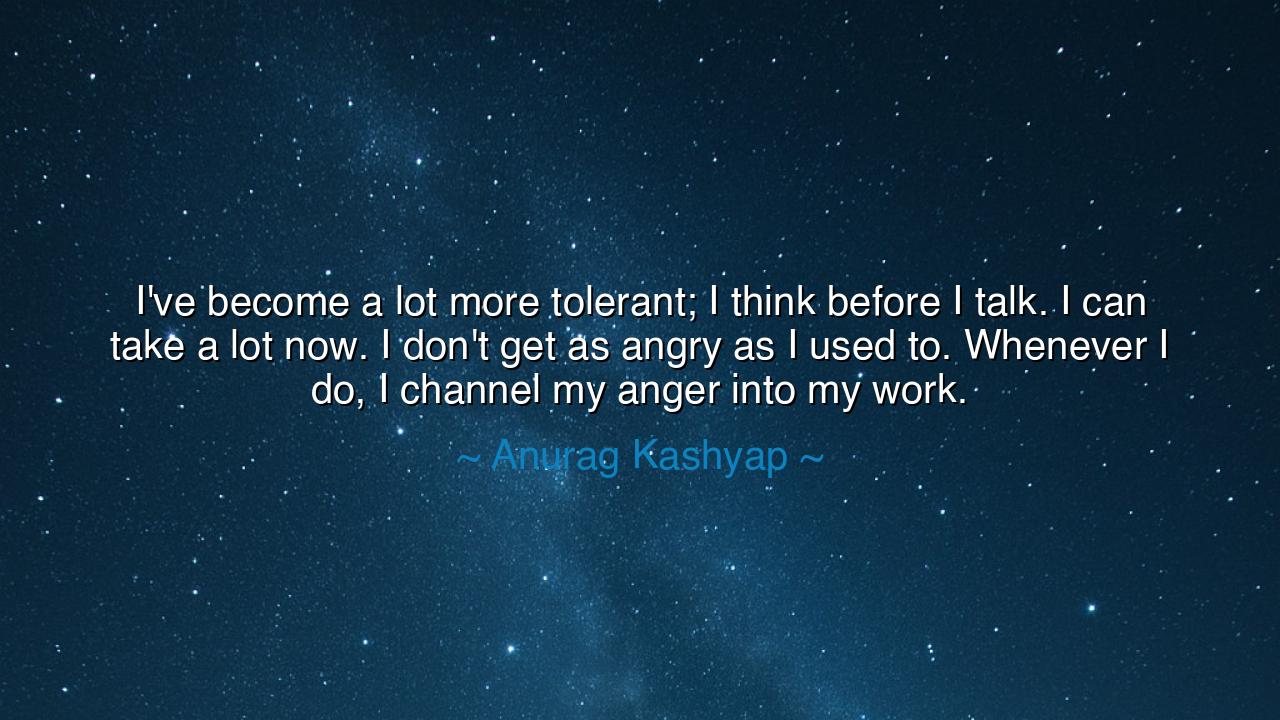
I've become a lot more tolerant; I think before I talk. I can
I've become a lot more tolerant; I think before I talk. I can take a lot now. I don't get as angry as I used to. Whenever I do, I channel my anger into my work.






Host: The room feels quiet, with the soft glow of the lamp casting a warm light across the space. Outside, the world has settled into the calm of the evening, creating the perfect atmosphere for a thoughtful conversation. Jeeny sits on the couch, her legs tucked beneath her, a cup of tea resting in her hands. Jack, standing near the window, gazes out at the darkened world, clearly reflecting on something. The peaceful atmosphere invites a deeper conversation about growth, anger, and channeling emotions.
Jeeny: “Jack, I came across a quote from Anurag Kashyap today that really made me think,” she says softly. “He said, ‘I’ve become a lot more tolerant; I think before I talk. I can take a lot now. I don’t get as angry as I used to. Whenever I do, I channel my anger into my work.’ What do you think about that?”
Jack: He turns slowly, his brow furrowing slightly as he processes her words. “That’s really interesting. It’s almost like he’s saying that he’s grown emotionally. He’s learned to be more patient, more reflective, and less reactive. The fact that he channels his anger into his work instead of letting it overwhelm him shows a lot of self-discipline. It seems like he’s not denying his emotions, but he’s finding a way to use them constructively.”
Jeeny: “Exactly. It’s about self-regulation, isn’t it? Kashyap seems to be saying that, rather than letting his anger control him or harm his relationships, he’s learned to redirect it into something productive. It’s a reminder that emotions, even the more intense ones like anger, can be powerful forces — but we can choose how to express them. Channeling anger into work is a way of transforming that energy into something positive.”
Host: The light in the room feels softer now, as if the conversation is touching on something deeper about emotional growth and maturity. Jeeny speaks with an understanding that anger, when channeled productively, doesn’t have to be destructive. Jack stands still for a moment, reflecting on how emotions, often seen as obstacles, can actually become tools for personal growth and achievement.
Jack: “I think what’s really powerful here is the idea that anger doesn’t have to be suppressed or ignored. It’s a natural human emotion, and it’s okay to feel it. The trick is to manage it, to not let it take over or cause harm. Kashyap is using his anger as a source of motivation and focus, which is a healthy way of dealing with a difficult emotion.”
Jeeny: “Exactly. It’s a way of turning something that could be destructive into something that drives creativity and action. Instead of letting anger dictate his reactions or affect his relationships, he’s using it to fuel his work, to express himself and his frustrations in a way that is ultimately productive. That’s real emotional intelligence — being able to transform your emotions into something that serves you, instead of letting them control you.”
Host: The conversation seems to deepen now, as they reflect on how emotions like anger, which can often feel overwhelming or out of control, can be managed and even used to propel us forward. Jeeny and Jack both agree that it’s not about avoiding or repressing our emotions, but about learning how to channel them in a way that contributes to growth, productivity, and personal development. Anurag Kashyap’s words remind them that emotional maturity is about transformation — turning intense emotions into something constructive rather than destructive.
Jack: “It’s interesting because we’re often taught to avoid or suppress negative emotions like anger. But Kashyap is showing that we don’t need to fight them. We just need to know how to handle them. Instead of letting them spiral into something that takes over our lives, we can use them to fuel something meaningful, whether that’s our work or our creative pursuits.”
Jeeny: “Yes, and it’s not just about anger. It’s about all of our emotions. We have to learn how to manage them, how to feel them without being controlled by them. The idea of channeling emotions into our work or into something we care about gives us a sense of control, while still allowing us to be authentic with what we’re feeling.”
Host: The room feels quieter now, as if the weight of their conversation has settled into something deeper. Jeeny and Jack sit together, reflecting on how emotional maturity involves not suppressing emotions like anger, but learning how to express them in ways that empower us. Anurag Kashyap’s words serve as a reminder that emotions are a powerful force, and with the right mindset, they can be channeled into creativity, growth, and self-expression, transforming negative energy into positive action.






AAdministratorAdministrator
Welcome, honored guests. Please leave a comment, we will respond soon